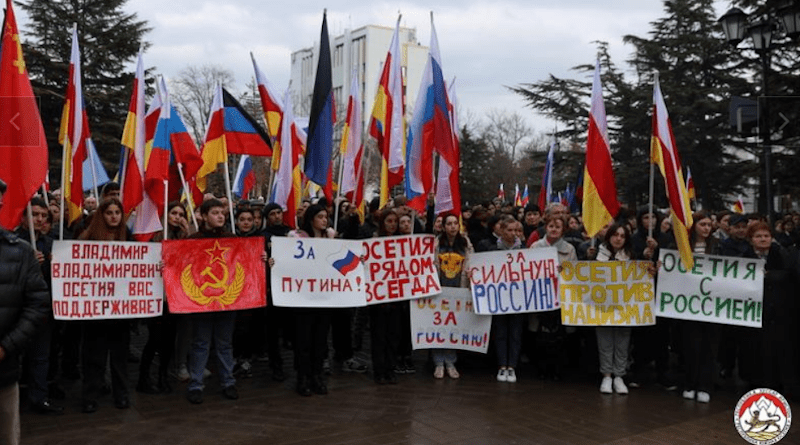Georgia’s Separatist Regions Stand With Russia – OpEd
The recent United Nations vote condemning Russia’s invasion of Ukraine shows that Vladimir Putin’s allies are few and far between. But not all of Russia’s allies are members of the UN. While most of the international community has condemned Moscow, support for Putin’s invasion of Ukraine is high in the Russian backed separatist states of Abkhazia and South Ossetia.
The fact that Abkhazia and South Ossetia support Russia’s invasion of Ukraine is unsurprising. Afterall, the two separatist states depend on Moscow for economic, diplomatic, and military support. Yet, elites in Abkhazia and South Ossetia have defended Russia’s position far more vigorously than their counterparts in Transnistria, another separatist state that depends on Russia.
Russia’s decision to recognize the Donetsk and Luhansk People’s Republics (DPR and LPR) as independent states on February 21, 2022, was welcomed by the separatists in Abkhazia and South Ossetia. Moments after Vladimir Putin made his announcement, the de-facto Presidents of Abkhazia and South Ossetia, Aslan Bzhania and Anatoly Bibilov, both issued statements supporting Russia’s decision. The same night, pro-Russian celebrations also took place on the streets of South Ossetia’s de-facto capital, Tskhinvali.
On February 22, Bzhania and Bibilov sent congratulatory letters to the separatist governments of the DPR and LPR. At the same time, the de-facto parliament and Ministry of Foreign Affairs in Abkhazia and South Ossetia issued statements of support. In South Ossetia, the KGB praised Russia’s decision to recognize the DPR and LPR, claiming it would “bring peace to Ukraine”.
Since the invasion, Abkhazia and South Ossetia have forged closer ties with the DPR and LPR. As tensions rose between the separatists and Ukraine, Abkhazia and South Ossetia agreed to take a small number of refugees. Those that arrived from the Donbas have been provided with accommodation and access to medical treatment. Children from the DPR and LPR are currently enrolled in Abkhazian and South Ossetian schools. The Ministry of Emergency Situations in Abkhazia has also agreed to provide the Donbas with humanitarian aid.
The Abkhaz parliament announced its recognition of the DPR and LPR, something South Ossetia did back in 2014. Both de-facto states fully ascribe to Putin’s narrative that he is taking steps to protect Russia and “denazify” Ukraine. Bzhania stated that Russia could not be the aggressor in this conflict, for Russia “is always guided in its foreign policy by the principles of peace-loving and good neighborliness.”
The South Ossetian media endorses conspiracy theories, such as that United States will use chemical weapons in Ukraine and blame Russia, or that Ukraine can make its own nuclear weapons.
In Abkhazia and South Ossetia, both the separatist governments and the media are adamant that the Maidan revolution was a western-backed coup that installed a neo-Nazi puppet regime intent on persecuting Russian speakers. The de-facto Ministry of Foreign Affairs in Abkhazia cited the 2014 clash in Odesa as “proof” that Ukrainian nationalists committed genocide against Russians. In a rally organized in support of Russia’s actions in Tskhinvali, Bibilov railed against the neo-Nazi regime in Kyiv. In a subsequent press release, Bibilov accused the West of “idealizing fascists.” Representatives from Abkhazia and South Ossetia recently issued a joint statement of support for Russia’s invasion of Ukraine.
Many people in Abkhazia and South Ossetia also support Russia’s invasion of Ukraine. At least 1,000 people attended Bibilov’s rally in Tskhinvali on March 2. Several pro-Russian rallies were organized in Sukhumi, the de-facto capital of Abkhazia. In one demonstration, several cars formed the letter “Z,” used to signal support for Russia’s invasion. The de-facto government also announced plans to hold a mass rally in support of Russia in FC Dinamo Sukhumi’s stadium on March 11.
Even outside of Abkhazia, ethnic Abkhaz have been keen to demonstrate their support for Putin. For example, In the Russian city of Yaroslavl, members of the Abkhaz diaspora, and local Chechens, organized a motor rally in support of Russia’s invasion of Ukraine.
Russia’s unjustifiable invasion of Ukraine is a blatant violation of international law that has bought about the undue suffering of an entire nation. But the separatist leaders of Abkhazia and South Ossetia, as well as their populations at large, do not see it that way. Instead, many believe that Russia is legitimately defending the rights of Russian speakers in the Donbas. Given that Abkhazia and South Ossetia are dependent on Moscow, it is unlikely that peoples’ opinions there will change anytime soon.

